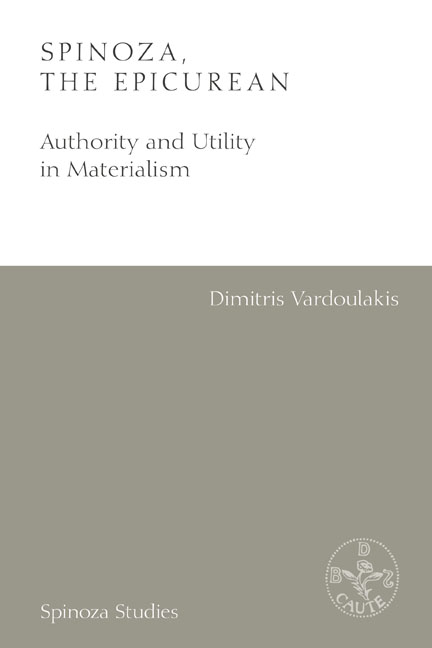Book contents
- Frontmatter
- Contents
- Reference Guide to Spinoza’s Work
- Acknowledgements
- Dedication
- Preamble
- Introduction: Why is Spinoza an Epicurean?
- 1 Freedom as Overcoming the Fear of Death: The Dialectic of Authority and Utility in the Preface
- 2 The Power of Error: Moses, the Prophets and the People (chapters 1, 2 and 3)
- 3 Philonomianism: Law and the Origin of Finitude (chapter 4)
- 4 Political Monism: The Primacy of Utility over Authority (chapters 5 and 6)
- 5 Love your Friend as Yourself: The Neighbour and the Politics of Biblical Hermeneutics (chapters 7 to 13)
- 6 The Freedom to Philosophize: The Two Paths to Virtue (chapters 14 and 15)
- 7 Fear and Power: Natural Right and Authorization in Spinoza and Hobbes (chapter 16)
- 8 Theocracy: On the State of Authority (chapters 17 and 18)
- 9 The Authority to Abrogate: The Two Paths to Virtue and the Internal Enemy (chapters 19 and 20)
- Conclusion: The Limitation of Spinoza’s Epicureanism
- Bibliography
- Index
8 - Theocracy: On the State of Authority (chapters 17 and 18)
Published online by Cambridge University Press: 20 October 2020
- Frontmatter
- Contents
- Reference Guide to Spinoza’s Work
- Acknowledgements
- Dedication
- Preamble
- Introduction: Why is Spinoza an Epicurean?
- 1 Freedom as Overcoming the Fear of Death: The Dialectic of Authority and Utility in the Preface
- 2 The Power of Error: Moses, the Prophets and the People (chapters 1, 2 and 3)
- 3 Philonomianism: Law and the Origin of Finitude (chapter 4)
- 4 Political Monism: The Primacy of Utility over Authority (chapters 5 and 6)
- 5 Love your Friend as Yourself: The Neighbour and the Politics of Biblical Hermeneutics (chapters 7 to 13)
- 6 The Freedom to Philosophize: The Two Paths to Virtue (chapters 14 and 15)
- 7 Fear and Power: Natural Right and Authorization in Spinoza and Hobbes (chapter 16)
- 8 Theocracy: On the State of Authority (chapters 17 and 18)
- 9 The Authority to Abrogate: The Two Paths to Virtue and the Internal Enemy (chapters 19 and 20)
- Conclusion: The Limitation of Spinoza’s Epicureanism
- Bibliography
- Index
Summary
To understand what Spinoza is aiming at as he returns to a discussion of the Hebrew state in chapters 17 and 18, we need to consider the structure of the third part of the Theological Political Treatise.
In chapter 16, Spinoza focuses on what I have called (since section 2 of Chapter 4) natural democracy. Immediately after defining democracy as ‘the most natural form of state’, Spinoza adds: ‘For in a democratic state nobody transfers one's natural right to another so completely that thereafter one is not to be consulted; one transfers it to the majority of the entire society [in majorem totius Societatis] of which one is part. In this way everyone remains equal, as they were before in a state of nature’ (179/195). The democratic state is characterized by the exercise of right in an organized political community. We could express this by saying that in such a society natural right is determinative of civil law. There is an equality of people in such a community. This is identical with the description of what I called natural democracy in Chapter 4. Spinoza then adds the following methodological remark: ‘And there is this further reason why I have chosen to discuss at some length only this form of state [solo imperio]: thereby my main purpose is best served, which is to discuss the utility of freedom in a commonwealth [de utilitate libertatis in Republica agere constitueram]’ (179/195). This is the only form of state that Spinoza discusses in chapter 16. The examination of natural right or how useful phronesis is to society only allows for an examination of democracy.
This methodological observation needs to be situated in terms of the distinction between the two regimes of power that Spinoza identifies in chapter 5 of the Theological Political Treatise, namely, natural democracy as the regime that relies on equality, and the state of authority as the regime that relies on obedience. As I explained in Chapter 4, both of these regimes of power require that the people calculate their utility. Further, as we saw Balibar arguing earlier, the good or political virtue can be attained by following either of two distinct paths: the path of reason or the path of the emotions.
- Type
- Chapter
- Information
- Spinoza, the EpicureanAuthority and Utility in Materialism, pp. 263 - 295Publisher: Edinburgh University PressPrint publication year: 2020



